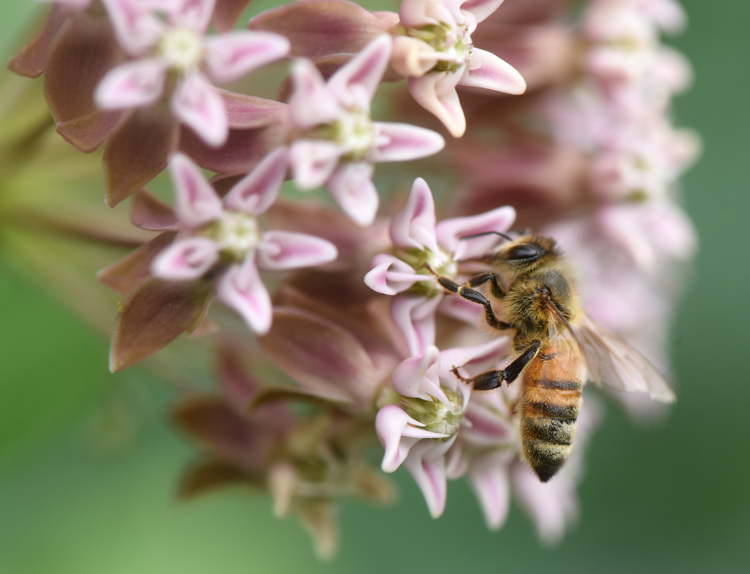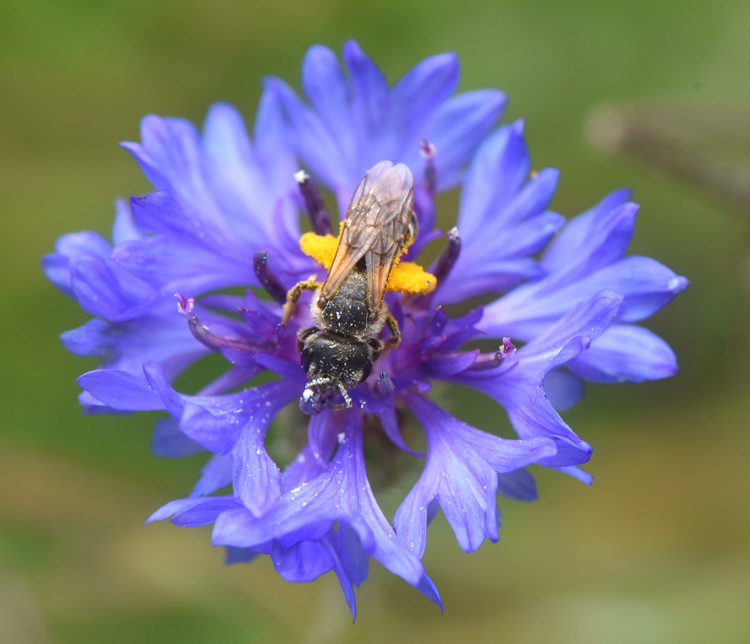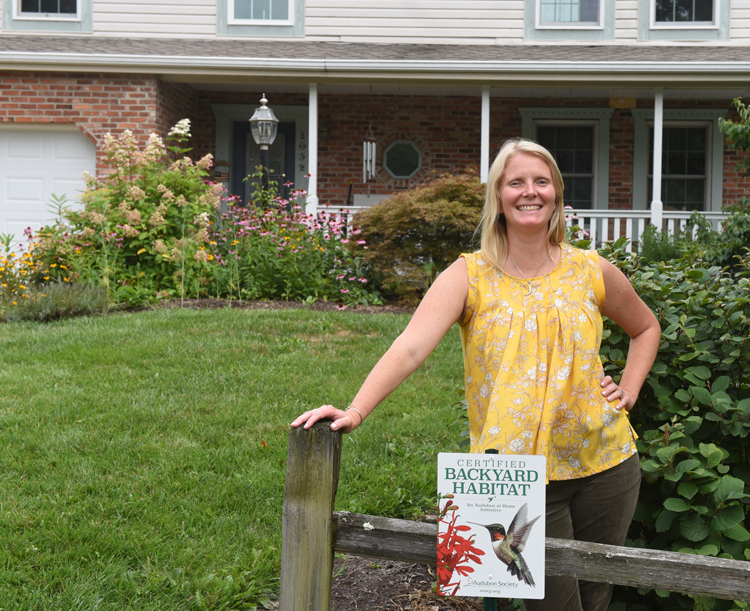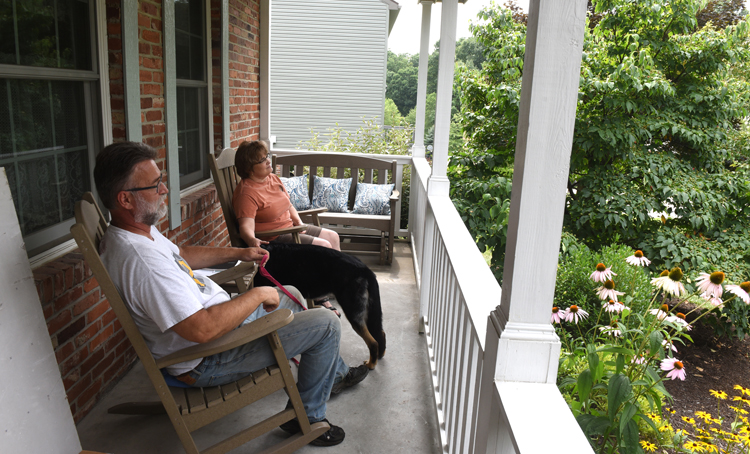Audubon Society will help convert your garden into a Certified Backyard Habitat
Posted on: August 16, 2018 | Written By: Doug Oster |
Bumblebees fly furiously from flower to flower, finding the aromatic and beautiful native bee balm blooms as honeybees feast on swamp milkweed in the Gibsonia garden of David and Laurie Jones. The couple is working on making their yard a Certified Backyard Habitat, a program offered by the Audubon Society of Western Pennsylvania.

Laurie and David Jones of Gibsonia are working on turning their garden into a Certified Backyard Habitat, a program offered by the Audubon Society of Western Pennsylvania. A honeybee feasts on the flowers of swamp milkweed, it’s one of the plants that’s also a host plant for monarch butterflies. Photos by Doug Oster
“I’ve been an organic gardener forever,” David says proudly. “Both my grandfathers were gardeners.”
His paternal grandfather was actually a botanist at the University of Massachusetts. “That’s all he did was organic,” David added.
As members of the local Audubon Society, they read about the program and decided to see what it would take to get an official designation.

A native bee is covered in pollen visiting bachelor button flowers in the garden of Laurie and David Jones.
There are five categories as part of the certification: native plants and creating a canopy of layers; organic practices; wildlife stewardship; clean water; and education engagement, explains Sarah Koenig, conservation director for the society.
“It’s designed to connect people with the resources they need to create habitat in any space that they have,” she says. “You can do it anywhere, from a balcony to a large yard.”
The Joneses already had many of the qualifications but are still working to add more native plants, an important aspect of the program.

Sarah Koenig is conservation director for the Audubon Society of Western Pennsylvania. She’s hoping homeowners will turn their gardens into Certified Backyard Habitats.
“Natives are beautiful,” Koenig says. “They are adapted to our local conditions. They require less water. They don’t need pesticides or fertilizers. There are thousands of natives, so you have so many different choices.”
There are more than 100 varieties offered at the Audubon Center for Native Plants at Beechwood Farms.
The canopy layers she refers to start with tall overstory trees — oaks are one great choice for wildlife.
“They support 536 species of lepidoptera, which are moth and butterfly caterpillars,” she says. “That’s a really important source of food for birds. A single brood of chickadees requires 6,000 caterpillars to survive.”
Next is the understory layer, and the Joneses are growing serviceberry trees to fill that role. They are a care-free small tree that’s also great for wildlife. It also supports more than 100 different species of moths and butterflies as either a larval host or nectar source. The flowers also help native bees, and the berries are treasured by birds.
The couple has elderberries growing for the shrub layer, which is a great choice and Koenig has another suggestion.
“Spicebush is deer resistant, a host plant for different butterflies and makes fruit,” she says.
Native perennials and annuals can be used for the ground layers and the No. 1 plant for her and the Joneses is probably milkweed. They are growing common and swamp milkweed, as the species is the only host plant for monarch butterflies. They are also working on adding plants that bloom later in the season, as they have lots of spring and summer flowering plants.
“The area where the serviceberry is,” Laurie says, “we’re going to plant ironweed in there and other shrubs.”
It’s easy for homeowners to create a backyard habitat with the help of the Audubon Society. An expert will come to a home, walk the property and talk with the owner about goals and challenges, then will create a customized report and plan to work toward certification.
So far 69 properties are part of the program, which covers seven counties in southwestern Pennsylvania. To encourage pollinators and help nature, it’s important to use natural practices in a backyard habitat.
“We ask folks to avoid neonicotinoids (a chemical pesticide) at all cost,” Koenig says, “to reduce chemical use and to reach the highest level of certification, we’re looking for organic practices only.”
Nature can put on quite a show on an organic lawn. The Joneses witnessed quite an amazing spectacle when a flying insect hatched in the grass.
“About five or six feet off the ground, there were a whole bunch of dragonflies that were just going back and forth picking them off,” David recalls. “It was a feeding frenzy.”
Above the dragonflies, tree swallows scoured across the sky getting their fill, too. Looking upwards, the couple was amazed to see thousands of hatchlings escaping.
Koenig is passionate about working for the Audubon Society of Western Pennsylvania and expects the Backyard Habitat Certification program to be a hit with gardeners everywhere.
“This is a dream job, I get to work with people to really connect them with things that matter,” she says smiling. “This is action you can take on your one property to make a difference and together with your neighbors, you’re making an even more significant impact.”

Laurie and David Jones enjoy sitting on their front porch in the morning to watch the wildlife visit their plants.
For the Joneses, they’ve already started reaping the benefits of their backyard habitat.
“We sit on our front porch in the morning, and to be able to see the birds coming by, the pollinators, it’s amazing, Laurie says. “Just watching them together.”
Doug Oster is editor of Everybody Gardens, a website operated by 535Media, LLC. Reach him at 412-965-3278 or doster@535mediallc.com. See other stories, videos, blogs, tips and more at everybodygardens.com.
Details: The project is funded by the Richard King Mellon Foundation. Homeowners only pay $35 if they’re an Audubon member and $50 for non-members, but the former includes a one-year membership to the society.
The Audubon Society of Western Pennsylvania has outreach for groups interested in the program and is also holding a Backyard Habitat Workshop series on September 22, 2018.
Go to www.aswp.org or call 412-963-6100 for more information.
Check out this story about a pollinator garden at the Pittsburgh Zoo and PPG Aquarium.